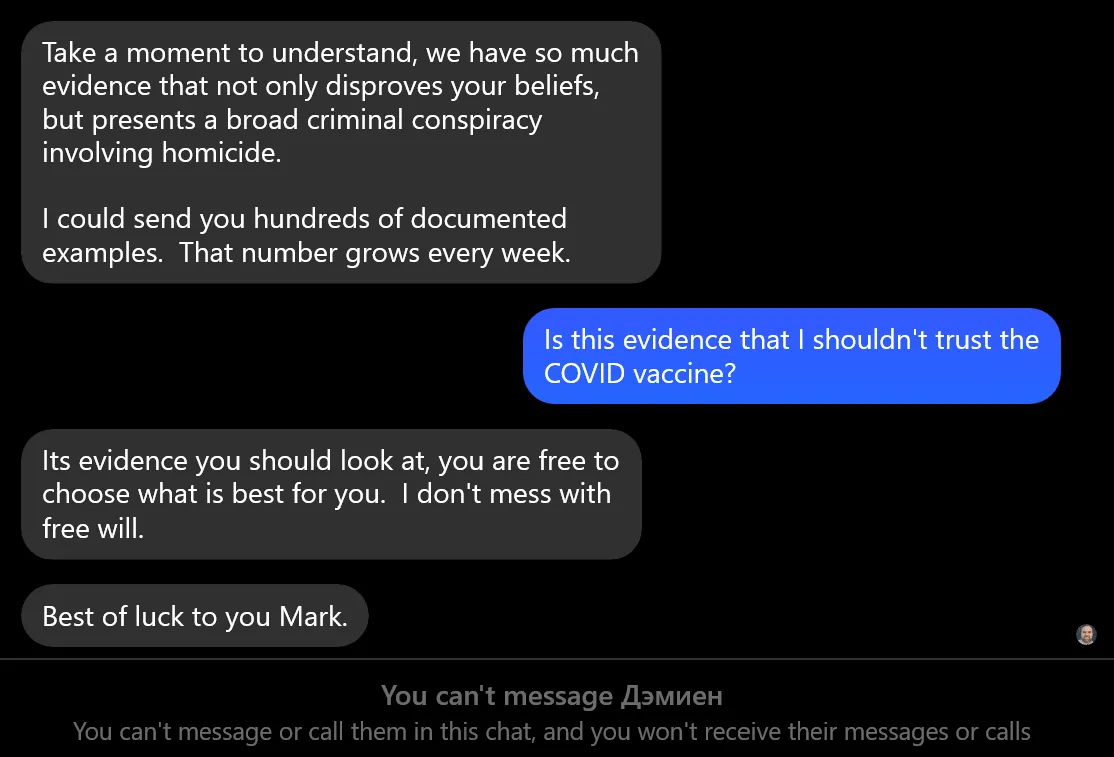My Friend Damien
Mark Honeychurch - 25th December 2023
Although most of my friends on Facebook are either skeptically-minded or at the very least have a respect for science and evidence, I do have some outliers. In the past I’ve sent or accepted friend requests from visiting Mormons, conspiracy theorists and others who are comfortable engaging with me. Additionally, a significant proportion of the time I spend on Facebook is spent browsing the facebook feeds of people who have a very different world view to mine.
Because of this, it’s not surprising when Facebook makes friend suggestions of people who are the antithesis of skeptical. A few days ago, Facebook suggested that maybe I wanted to be friends with prominent New Zealand conspiracy theorist “Дэмиен Демент”.
Now, it’s likely you have no idea who I’m talking about here. Дэмиен Демент is a Russian name. But, with the magic of Google Translate, we can see that this sneakily named account belongs to none other than Damien De Ment.
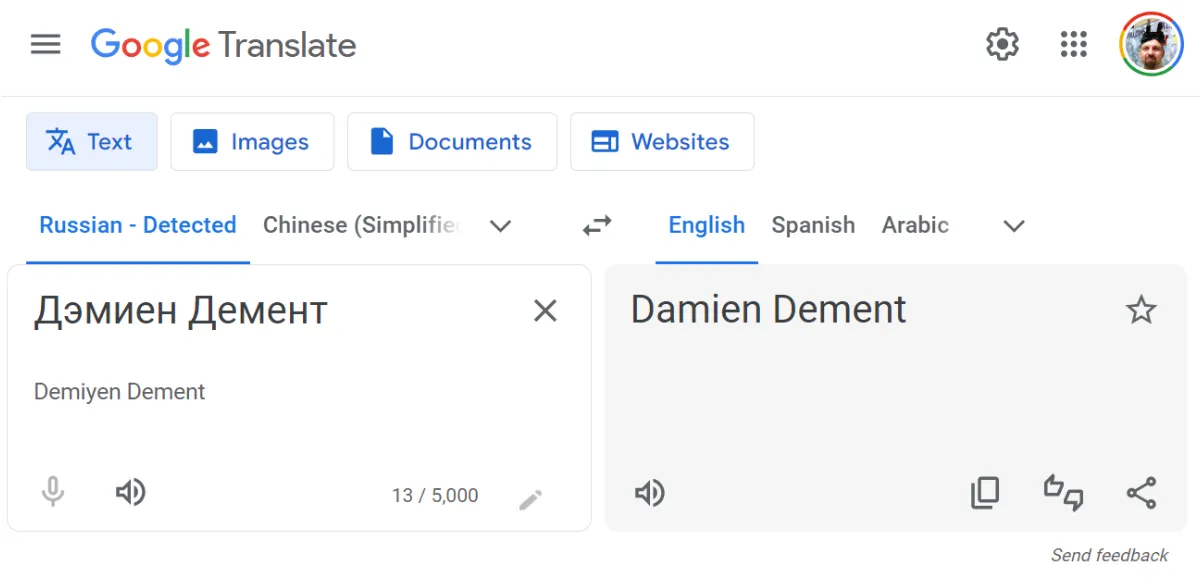
I have to assume that, by now, Damien is so fed up with having his social media accounts banned that he’s taken to creating new accounts with fake names in an effort to evade the ban hammer.
Okay, many of you are probably still unaware of who I’m talking about. Damien is an American man who has chosen to make New Zealand his new home, and has also decided that he need to wake up everyone in our country to the truth that successive governments are hiding their real agenda of mass enslavement and/or murder from us.
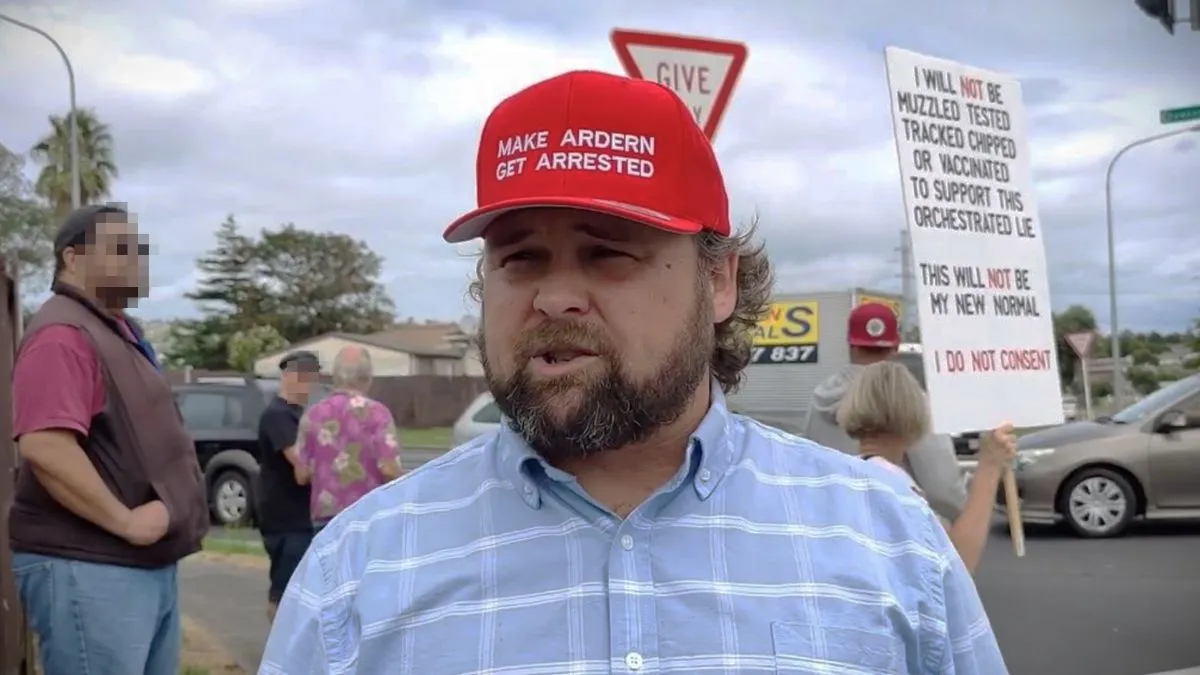
For a little more of Damien’s back-story, you can hear it in his own words from a talk he gave at a picnic held in honour of “whistleblower” Barry Young:
Sitting there, faced with Facebook’s invite to connect with Damien De Ment, I thought it would be fun to click the button and see what happens! About a day later, I received a private message from him:
Hi Mark,
Why are you friend requesting me?
Give me a reasoned answer, because typically your kind are no help to anyone but yourselves.
Ooof, he came out of the gate strong! By “your kind”, I think he means skeptics, and I’m going to take it as a compliment that he either already knows I’m a skeptic, or bothered to do enough “research” to find out that I’m one.
Hmmm, how to respond. Well, I figured honesty would be a good tactic.
Hey, Damien. Although I disagree with a lot of what you believe, I don’t see that as necessarily a barrier to connecting on Facebook. I have quite a few Facebook friends already who think differently to me, and so when the app suggested you as a friend, I thought “hmmmm, why not!”. I totally understand if you want to reject my request. Either way, have a great Christmas!
What followed, a day later, was a simple question: “Mark, do you trust the COVID vaccine or not?”. I immediately responded with a simple “Yes”, and then received the question “can you honestly say you have reviewed all evidence?”, followed by several messages in quick succession in response - I can only assume that Damien had spent some time over the previous 24 hours preparing his challenge:
_Skeptics look beyond belief
As a scientist, Wiles is naturally sceptical - her job is to find out how things work. She tries to instil the same critical thinking in her seven-year-old daughter Eve, who is beginning to grapple with the universe’s big questions herself: like, should we take leaps of faith when evidence is nowhere to be found?
Wiles is one of a small group of dedicated New Zealanders who believe the answer is a categorical ‘no’ - and spend significant time and energy getting that message heard.
Its members are part of an organised worldwide movement, committed to investigating dubious claims and believing only that which can be proven.
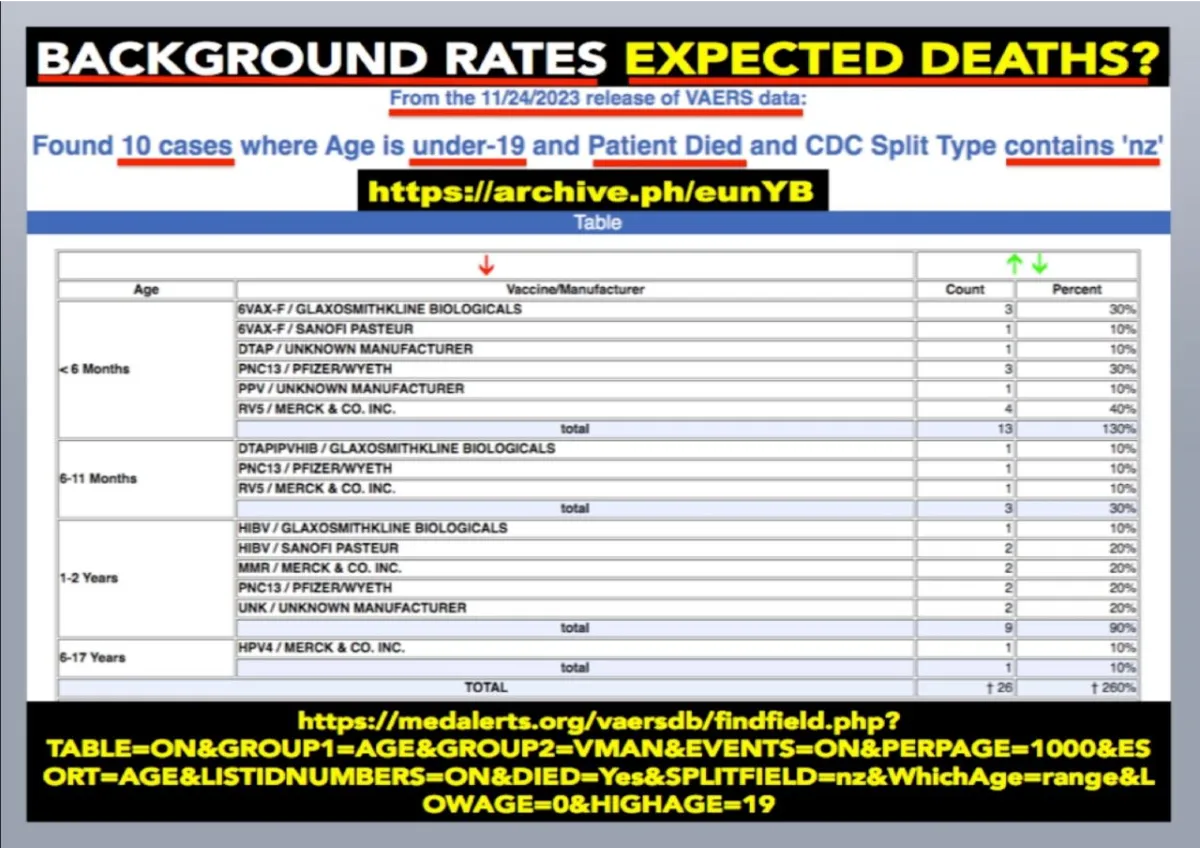
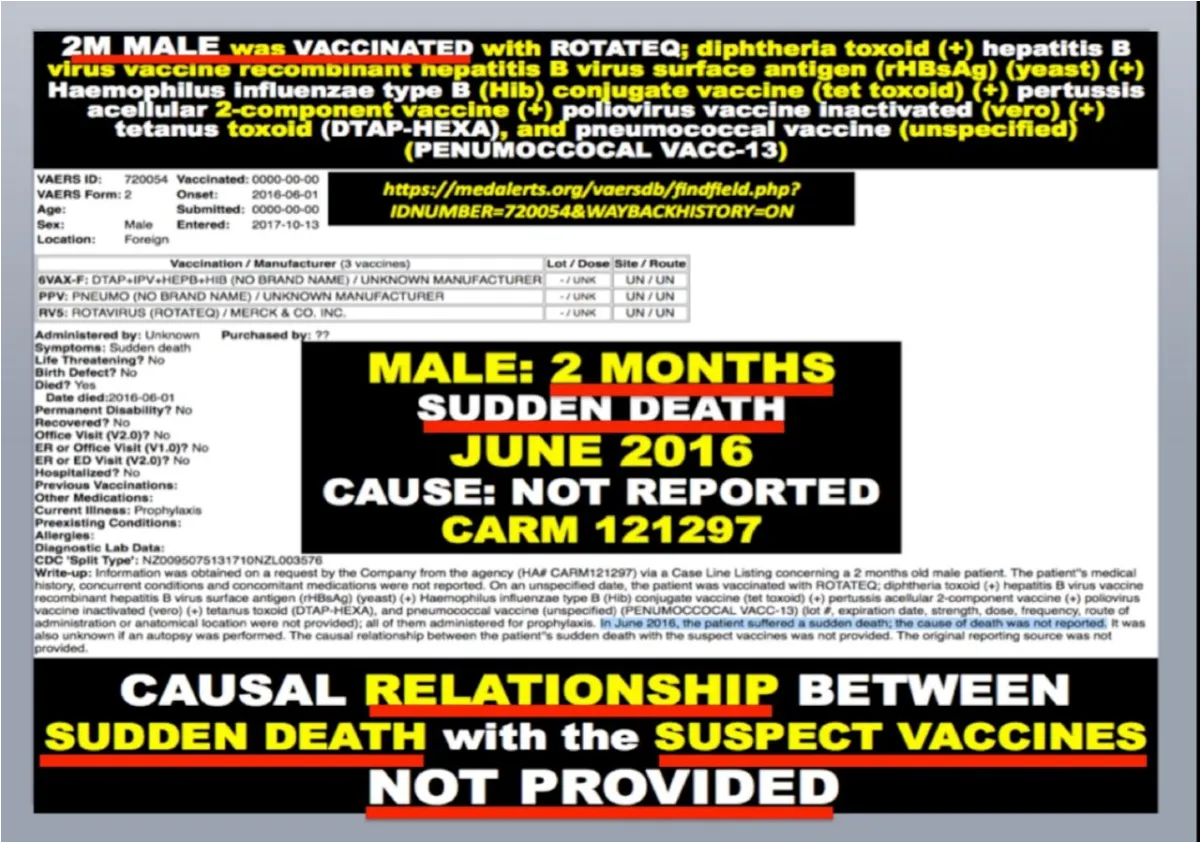
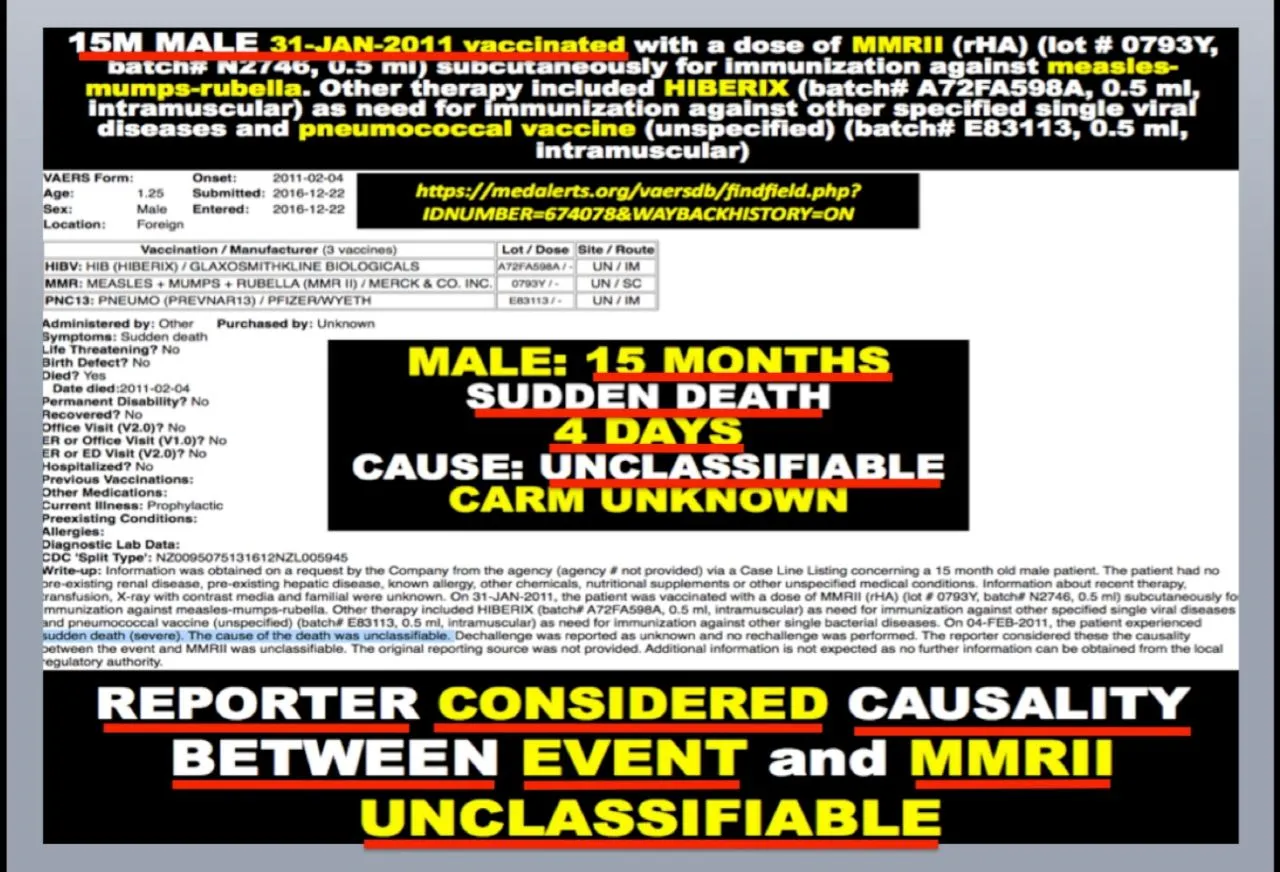
He continued, saying: “Take a moment to understand, we have so much evidence that not only disproves your beliefs, but presents a broad criminal conspiracy involving homicide. I could send you hundreds of documented examples. That number grows every week.”
This Gish Gallop of quick-fire messages was interesting, but not in the way Damien thinks it is.
Firstly, Damien has a thing for Siouxsie Wiles, and considers her to be a dangerous person who is complicit in poisoning millions of people in New Zealand via the COVID vaccine. I guess he’s sent me this quote because he thinks that drawing a link between Siouxsie and the NZ Skeptics is a damning gotcha.
Next, the provided VAERS links, along with screenshots containing badly worded text pasted over the top of them, do not show that there’s a criminal conspiracy to deliberately kill a portion of the population through vaccinations.
The first image and link show search results in the VAERS (Vaccine Adverse Event Reporting System) database for the keyword “nz” and an age of under 19. The search for “nz” appears to match on the “CDC Split Type” field in the database, and it looks like country codes for Foreign cases are stored in that field, so it makes sense to search for that. There are a total of 10 results returned.
The second screenshot shows a case not included in the search results (case 720054), and the third screenshot is of one of the 10 cases returned by the search in the first screenshot (674078).
I have to stress that these are unqualified data points, and not confirmed deaths from vaccines. The website linked to, MedAlerts, is run by the National Vaccine Information Center, a well-known anti-vaccine group in the US. Even on this antivax site’s copy of the government’s VAERS database, there’s a link to a disclaimer on the official VAERS website at the top of each page. The bolded parts of the disclaimer read:
Anyone, including Healthcare providers, vaccine manufacturers, and the public can submit reports to the system. While very important in monitoring vaccine safety, VAERS reports alone cannot be used to determine if a vaccine caused or contributed to an adverse event or illness… VAERS reports may contain information that is incomplete, inaccurate, coincidental, or unverifiable… The number of reports alone cannot be interpreted as evidence of a causal association between a vaccine and an adverse event, or as evidence about the existence, severity, frequency, or rates of problems associated with vaccines.
Back in 2021, when I talked on the radio with Graeme Hill about the issues around using raw VAERS data, I said the following:
So, what is VAERS, and are thousands of people dying? VAERS is the Vaccine Adverse Event Reporting System, and is a reporting system in the US for vaccine injuries. In many ways it’s just like the long list of articles in the 100 page document - cases of people dying or having adverse effects after receiving a vaccine. Remember that anyone can fill in the VAERS form and report an incident of vaccine injury, just like any reporter can print a story suggesting a causal link between a vaccine and subsequent medical issue. As of last Friday there are 772,661 cases related to COVID [vaccines] in the database, listing conditions from Fever (~120,000), Pain (~69,000), Screaming (~7,000) and Sneezing (~1,200) to Female Orgasmic Disorder (1), Gulf War Syndrome (2), Early Sexual Debut (1), Fractured Coccyx (1) and Circumcision (1).
And this is where the skepticism comes in. There’s a commonly used phrase in skepticism: “correlation is not causation”. In this instance the two events that are correlated are people being given the COVID vaccine and then subsequently getting sick or even dying. From here, for many people, it’s a short, and understandable, leap of logic to connect the two events - a causative link. We even have a fancy Greek phrase for this fallacy, when people jump to the conclusion of assuming that because one event happens after another event, it therefore happened because of it - “post hoc, ergo propter hoc”, literally translated as “after this, therefore because of this”.
Now, this is not to say that all correlations are not causation - we jump to this conclusion because very often events that follow each other do have a causative link. But the trap here is to jump to that conclusion prematurely. In the case of vaccines, a very contentious issue, we have to look at the background rates of death and injury in the absence of being given a vaccine - a control group. Time and again for vaccines, when we look at this incidence of issues in the control group, we see similar rates of death and injury - meaning that the vaccine is not responsible for the issues.
People get sick, pre-existing conditions flare up, new conditions emerge, and sometimes people die - even when they’re young, fit and healthy. Vaccines aren’t to blame for these issues, they just happen to be in the wrong place at the wrong time. This is not to say that vaccines are blameless - sometimes there are real issues caused by vaccines, such as allergic reactions to an ingredient, or a complication such as infection from being injected. But the dangers of these rare events are much lower than that of the disease the vaccine is protecting against.
The CDC are well aware of the issue of spurious correlations, and are likely also aware of the zealous nature of vaccine deniers, and the risk of outright false reports. As such, they have warnings before you can see the data, and you have to click to confirm you understand that the data is not proof of vaccine injuries. The CDC have posted this on their VAERS front page:
“VAERS is not designed to determine if a vaccine caused or contributed to an adverse event. A report to VAERS does not mean the vaccine caused the event.”
This is why we need scientists as a layer between us and raw data - they have methods of sifting through the reports to uncover actual risks. An uninformed person reading through headlines or looking at the VAERS database entries for COVID could come away thinking that the COVID vaccines are dangerous. But when this raw data is filtered properly by experts, it turns out that so far the side effects we have seen are much less of a problem than the damage that would have been caused in the same population by COVID-19.
So, basically, Damien is confused about what the VAERS database is, and how science works, and is treating these reports as gospel. I replied to him, and asked him:
Is this evidence that I shouldn’t trust the COVID vaccine?
His response was:
Its evidence you should look at, you are free to choose what is best for you. I don’t mess with free will.
Best of luck to you Mark.
And, with that, he was gone. Damien blocked me immediately on Facebook, without waiting for any kind of an answer from me. Messenger told me “This person is not contactable on Messenger” and “You can’t message Дэмиен. You can’t message or call them in this chat, and you won’t receive their messages or calls.” I didn’t even get the chance to tell him that he’s fundamentally misunderstood what the VAERS database is, although I don’t suppose he’d have believed me even if I’d been given the opportunity to explain it to him.
